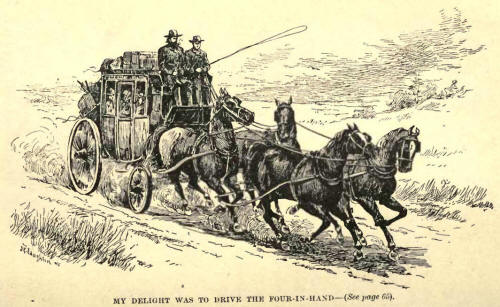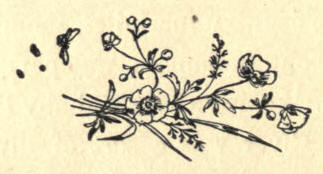|
WE had reached the prairie
country, woodland and plain intermixed. We were now at the end of our
steam transport service for this trip. We did hope to catch the only
steamer on the Red River of the North, but in, this were disappointed.
The next question was how to
reach the Red River; hundreds of miles intervened.
We found on inquiry that
there were two means of crossing the country in sight—one by stage-coach,
the other by Red River cart.
A brigade of these latter
having just then come in from the north, father and I went out to the camp
where these carts were, and the sight of them soon made father determine not
to travel with them. Our first sight of these Red River chariots was not
favorable. I climbed into one, but did so carefully, fearing it would
collapse with my weight. All the iron on it was a thin hoop on the hub, the
whole thing being bound together with rawhide. "No, gentlemen, we were as
yet too much 'tenderfeet' to risk such vehicles."
Imagine mother and my sisters
jogging hundreds of miles in those springless carts.
Father then went to interview
the proprietors of the stage line, and concluded a bargain with them to take
us from St. Paul to Georgetown, which place is on the Red River.
Accordingly, one morning bright and early, and long before breakfast, we
were rolling away up the eastern bank of the Mississippi—father, mother and
sisters inside the coach, and myself up with the driver. Our pace was good,
the country we were travelling through beautiful in its scenic properties.
We stopped for the first
stage at St. Anthony's Falls. Here we had our breakfast.
If anyone that morning had
said, "Just across yonder will stand one of the finest cities in America,
and that before many years," all the pessimists in the party would have
laughed at such a prophecy, but I verily believe, father would have said,
"Yes, it is coming."
Our drive that day took us
across the Mississippi to the village of St. Cloud, where father, learning
that the steamer on the Red River would not come up to Georgetown for some
time, concluded to stay over until the next coach, one week later.
In the meantime we made a
tent, and hunted prairie chicken, and studied German, or rather Germans, for
these made up the greater part of the population.
Taking the next coach the
following week, we continued our journey. Soon we left settlement behind,
the people of the stage-houses and stopping-places being the only
inhabitants along the route.
Many of these were massacred
in the Sioux rising which took place shortly afterwards.
Our stages ranged from twelve
to twenty miles, and we averaged seventy miles per day.
A great part of the route was
beautifully undulating, and fresh scenes were before us all the while.

My delight was to drive the
four-in-hand, and the good-natured drivers would give me many an opportunity
to do so.
It seemed like living to hold
those reins, and swing around those hills and bowl through those valleys at
a brisk trot or quick gallop.
By and by we reached the
beginning of the Red River. We were across the divide; we were coursing down
the country northward.
Hitherto it had been " up
north " with us, but now, for years, it would be "down north."
These waters flowed into
Hudson's Bay.
Presently we were on the
great flat plain, which largely constitutes the valley of the Red River.
At the stopping-place, on the
edge of this flat country, the stage people were about to leave the coach
and hitch on to a broad-tired, springless wagon, but father simply put his
foot down and we went on with our coach.
Talk about mosquitoes here,
they were there by the millions. Such a night as we put in on the
Breckinridge flats!
The stopping-place was unique
of its kind —a dugout with a ridge-pole and small poles leaned against this
on two sides, and earth and sods placed over these poles, and some canvas
hung at either end. The night was hot, the dugout, because of the
cook-stove, hotter still, and the mosquitoes in countless numbers.
Mother and my sisters were in
misery; indeed, we all were, but we comforted each other with the thought
that it was for one night only, and that respite would come in the morning.
My bed was under the table on
the mud floor. My companion for the night was the proprietor of this
"one-roomed mud hotel." The next morning the driver for that day said to me,
"Now, young man, make a good square meal, for to-night we will reach
Georgetown, and you will have only dogs and pemmican to eat." I asked him
what pemmican was, but he could not tell me. All he could do was to talk
about it.
All day we drove over this great flat plain —rich soil, long grass; the only
break was the fringing of timber along the river.
We had dinner and then
supper, and again the driver would admonish us to partake heartily of bacon
and bread, for to-night, said he, "we reach the land of pemmican."
My curiosity was greatly
excited as to what pemmican might be.
Late in the evening we
reached Georgetown. Here we were on the banks of the Red River, and at the
end of our stage journey, and where we hoped to find a steamer to take us
down to Fort Garry. Georgetown was situated a little north of the junction
of Buffalo Creek with the Red River. The town consisted of one dwelling
house and a storehouse, both belonging to the Hudson's Bay Company.
Here, though not yet in the
Hudson's Bay country, we were already in touch with this great company whose
posts reached from here to the Arctic and dotted the country from the
Labrador to the Pacific coast.
The gentleman in charge, a
Mr. Murray, learning of our destination, with the usual courtesy of the
Hudson's Bay Company's officers, welcomed us heartily, and gave up his room
to our family, and himself took up quarters with me in our tent, which we
speedily pitched near the bank of the river.
That night, before we went to
sleep, I inquired of Mr. Murray if he knew anything about pemmican, and with
a laugh he replied, "Yes, my boy, I was made acquainted with pemmican many
years ago, and will be pleased to introduce you to some in the morning." I
would fain have inquired about dogs, but my kind friend was already snoring.
I could not sleep so soon. This strange, wild, new country we had travelled
through for days, these Indian, and buffalo, and frontier stories I had
listened to at the stopping-places, and heard from the drivers as we
travelled—though born on the frontier yet all this was new to me. Such
illimitable plains, such rich soil, such rank grass—there was a bigness
about all this, and I could not help but speculate upon its possibility.
With the early morn we were
up, and using the Red River as our wash-dish, were soon ready to investigate
our new surroundings.
The first thing was pemmican.
Mr. Murray took me to the storehouse, and here, sure enough, was pemmican in
quantity. Cords of black and hairy bags were piled along the walls of the
store. These bags were hard, and solid, and heavy. One which had been cut
into was lying on the floor. Someone had taken an axe and chopped right
through hair and hide and pemmican, and here it was spread before me. My
friend stooped and took some and began to eat, and said to me, "help
yourself," but though I had not eaten since supper yesterday, and we had
driven a long way after that, still the dirty floor, the hairy bag, the
mixture of the whole, almost turned my stomach, and I merely said, "Thank
you, sir." Ah! but soon I did relish pemmican, and for years it became my
staple food.
It was a wonderful provision
of Providence for the aboriginal man and the pioneer of every class.
For days we waited for the
steamer; not a word reached us from anywhere. In the meantime, father and I
hunted and fished; we shot duck and prairie chicken, and caught perch and
pickerel, and catfish and mud-turtles, and explored the country for miles,
though we were cautioned about Indians, a war-party of whom one might strike
anywhere and any time.
The Red River was a sort of
dividing line between the Ojibways and the Sioux, the former to the east and
the latter to the west of this long fluid line of natural division.
By and by the steamer came,
and, to our great disappointment the captain said he could not run her back
down for the water was too low.
This captain was not of the
kind of pioneer men who laugh at impossibilities.
The next thing was to load a
flat-bottomed barge and float her down.
We were allowed to erect our
tent on a portion of the deck of the scow, and soon we were moving down
stream, having as motive power human muscle applied to four long sweeps.
Day and night, with change of
men, our scow kept on down this slow-currented and tortuous stream. The only
stop was to take on wood for our cooking stove. Here I learned to like
pemmican.

|
